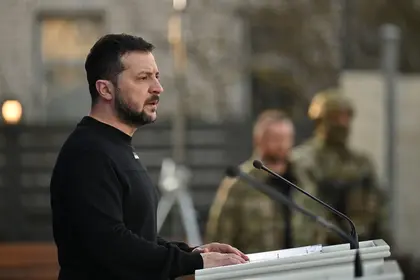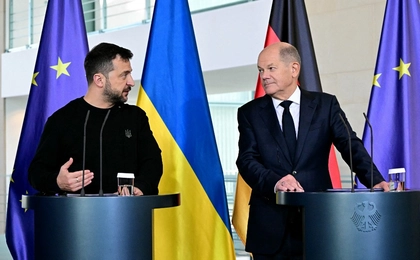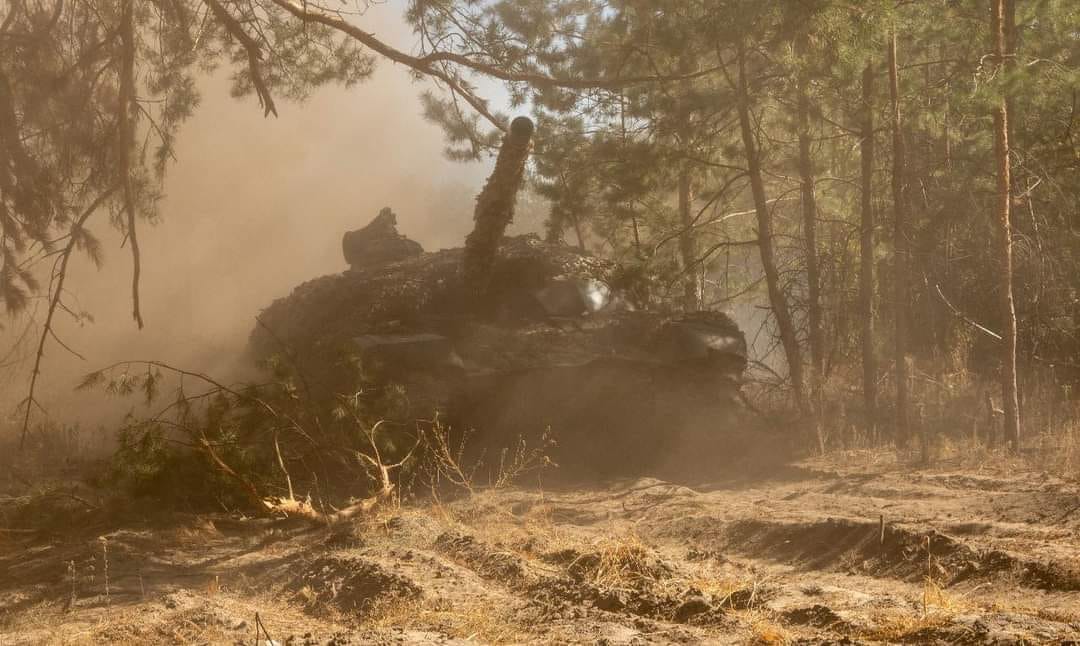Spoiler alert: The answer is no. President Volodymyr Zelensky has most definitely not converted to Christianity. But he certainly has changed.
His address on Easter Sunday, just like so many of his previous addresses to the Ukrainian nation over the course of the past 400-plus days, was moving, heartfelt, inspirational. We’ve come to expect nothing less from him.
Moreover, it confirms his staggering capacity to convey a simple message: Together, united, we will not merely survive. We will prevail.
The Dark Night of a nation’s soul
Wearing a black shirt with traditional embroidery in olive green depicting tridents and crossed swords – ancient symbols of Kyivan Rus – Zelensky began by smoothly engaging his audience. He’s a natural-born mood-setter, be it humorous or solemn. This is how he became a famous comedian and actor.
But Zelensky – as well as those who help write his speeches – are also master rhetoricians.
In the Orthodox tradition, Easter is celebrated symbolically as light coming into the darkness of a fallen world. The liturgy is celebrated at midnight, with the faithful holding candles that symbolize the light of Christ rising from the darkness of the tomb.
Zelensky’s speech opens straightaway with the metaphor of light and darkness: “At the end of last winter, Russia brought a full-scale war to our land. And with it – death, pain, and darkness. On the morning of Feb. 24, the sun never rose. Dawn never came. On the morning of Feb. 24, a dark night began.”

Ukraine - What Everyone Wants From a Peace Deal?
He then immediately counterposes the darkness with the leitmotif of light:
“And at the same time, our awakening began… Darkness could not overshadow our spirit, desire for freedom, love for our native land, and readiness to defend it.
“We have kept the light within us. We have conquered panic, fear, feuds, and quarrels. We have united. Millions of sparks in millions of Ukrainian hearts became one big bonfire.”
The speech builds this metaphor to frame for his audience the difficult year of struggle just experienced, and to brace everyone for an even more difficult year to come. “On this day a year ago, we all prayed that Ukraine would endure. Today – for Ukraine to win.”
The Cossack prayer
At the end of the speech, however, Zelensky seems to diverge from his normally careful and accessible choice of words. As the president of a multi-confessional nation, and himself of Jewish origins, he has always taken care not to commit to any one religious’ path.
Zelensky prepares his audience with a gentle preface: “With all our strength, we fight for our land and ask for the help of heavenly forces. In hundreds of prayers that our ancestors said before a battle, which help our soldiers and protect them today.”
And then it comes, the invocation of Jesus: “I will don the shroud of Christ”; followed by a flourish of archaic references: “my skin – an iron cuirass; my blood – strong ore; my bone – a bulat sword.”
For a second, I thought Zelensky was converting to Christianity in front of the nation. But the archaic language clued me in to the deft historical allusion.
The prayer continues; “I’m faster than an arrow, more alert than a falcon. The armor is on me. The Lord is in me.”
I suspect few people recognized the reference to the “Prayer of the Cossack Sorcerer,” meant to sap the strength of the enemy. I certainly didn’t.
Apparently, Zelensky and his speechwriters felt it was an appropriate prayer on the eve of an expected offensive that everyone quietly understands may lead to many unavoidable casualties.
The speech and prayer conclude with the obligatory reference to light: “For tomorrow. For a peaceful dawn. For victory. For Ukraine. Christ is Risen. Truly, he is risen.”
A conversion nonetheless
Anyone familiar with Zelensky’s career before he got into politics will know that his humor was rife with irreverence. In fact, a major part of his shtick was poking fun at how Ukrainians mythologize their Cossack ancestry.
Many hardcore nationalists loathed Zelensky for his skits, portraying Cossacks as gluttonous morons and/or crypto- and not-so-crypto-gay machos. His humor, however, was rather democratic, and he also felt free to play with Jewish stereotypes.
But Zelensky is no longer the irreverent comedian he once was.
Cynics may dismiss Zelensky’s about-face as merely a public relations campaign. But such a view would betray the mind of someone who hasn’t been to Ukraine in the past 9 years – and especially in the past 14 months.
Ukraine, with Zelensky as its leader – both political and moral – has changed. Dramatically. Magically. The war has tempered within him and the nation something akin to that mythologized Cossack spirit – wild, free, indomitable.
The President greeted his fellow Ukrainians on Easter Sunday like a man – dare I use the religious term? – transfigured; leading his people into a new light.
You can also highlight the text and press Ctrl + Enter






